Four Iranian Border Guards Wounded In Car Explosion Near Pakistan

Four border guards were injured in a booby trap car bomb near the Mirjaveh border with Pakistan in Iran’s Baluch populated southeast.

Four border guards were injured in a booby trap car bomb near the Mirjaveh border with Pakistan in Iran’s Baluch populated southeast.
According to state news agency IRNA, the condition of three of the injured is stable, but one was transferred to the provincial capital Zahedan for treatment.
Haalvsh website, which covers the events in Sistan-Baluchestan province, earlier reported that a military vehicle was targeted by an explosion in the Shahrak area of the border town of Mirjaveh.
It quoted local sources as saying that the situation is tense, and said military vehicles are patrolling the city. No group has yet claimed responsibility for the explosion.
Last week, an attack on a police station in the Sunni majority city of Zahedan claimed the life of two policemen. According to Iranian law enforcement officials, four gunmen who used hand grenades were also killed.
Tensions in Sistan-Baluchestan have been high since security forces, under the command of the Revolutionary Guards, killed an estimated 80-90 civilian protesters in the city on September 30, which became known as Black Friday.
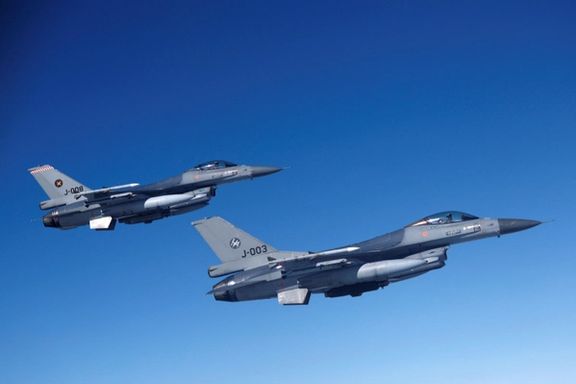
After adopting a more active posture to deter Iran in the Persian Gulf, the Pentagon said Friday it will deploy more warplanes to protect shipping in the region.
The US already uses A-10 fighter jets to patrol the strategic waterway, in particular the narrow Strait of Hormuz from Iranian attempts to seize oil tankers navigating in international waters, but it will now deploy additional F-16 jets.
A Pentagon official speaking to reporters on condition of anonymity said the F-16s will be an additional element to deter Iran and provide protection to commercial shipping.
Iran’s latest attempt to interfere with commercial shipping occurred earlier this month when it tried to seize two vessels. The US Navy announced July 5 that it prevented Iranian naval forces from diverting the vessels including the Richmond Voyager, a supertanker managed by Chevron in the Strait of Hormuz, the narrowest part of the Persian Gulf.
The official said that in both cases Iranian forces withdrew as the US Navy arrived on the scene.
Iran has been harassing commercial shipping in recent years and seized multiple vessels since 2019. Over the years, Iranian speedboats also harassed US Navy ships, sometimes in dangerous maneuvers.
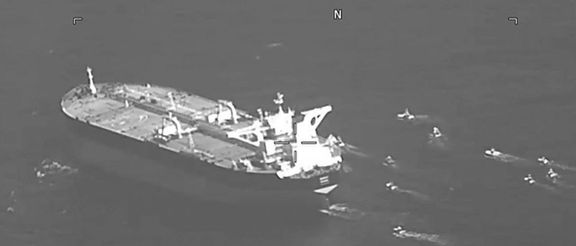
“[The] United States will not allow foreign or regional powers to jeopardize freedom of navigation through the Middle East waterways, including the Strait of Hormuz,” National Security Council Coordinator for Strategic Communications John Kirby told reporters May 12. The US Navy in early June said that Iran had interfered with or attacked 15 internationally flagged merchant ships over the past two years.
Iran’s provocative actions come as attempts to restrict its uranium enrichment and reach a nuclear agreement have remained unsuccessful since President Joe Biden assumed office in January 2021. Iran has expanded military cooperation with Russia, supplying hundreds of kamikaze drones that are being used in Ukraine against civilian and military targets.
The Pentagon official also told reporters the US is concerned about more Russian aggressive actions in Syria in collaboration with Iran and the Syrian government.
Recently Russian warplanes tried to interfere with operations of US military drones that were trying to attack Islamic State group targets in Syria.
The official told reporters that Iran’s supply of drones to Russia and support for the invasion of Ukraine has given political leverage to the Islamic Republic that wants to use the Russians to expel the United States from Syria. The US also believes there is more planning and intelligence sharing cooperation now between Russian and Iranian IRGC forces in Syria to pressure US to withdraw troops from Syria.
Iran also probably wants to use escalatory tactics to force Washington to accept its terms in recent reported diplomatic contacts between the two sides aimed at some sort of a deal over three Americans held hostage by Tehran.
Iran wants Washington to agree to around $20 billion of its funds in third countries to be released, which would be significant for its beleaguered economy. Iraq holds around $10 billion of debts to Iran, while South Korean banks hold another $7 billion.
Pro-Iranian Iraqi Shiite militia groups also organized a protest Friday near the US embassy in Baghdad, demanding non-interference by the United States in Iraq’s internal affairs. Iran however, is deeply enmeshed in Iraqi politics using its proxy forces.
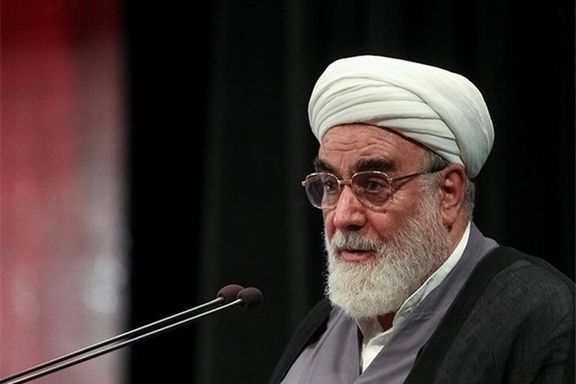
Iran’s Supreme Leader's Chief of Staff says the internet is a scourge, claiming that Ali Khamenei is the main target of people’s attacks.
According to Iranian media on Friday, Gholamhossein Mohammadi Golpayegani said: “The virtual space has become a bane, but despite their [enemies'] relentless efforts and investments in promoting indecency and other vices, they have not succeeded in alienating people from their religion and beliefs", referring in regime terminology to the US and Israel.
He mentioned large religious ceremonies – sponsored and organized by the regime with rent-a-crowd demonstrations – as proof of the enemies’ failure in their attempts to water down the nation's religious ideology.
His remarks came amid a widespread disregard for religious laws in Iranian society. Despite threats and prosecution by the regime’s authorities, a growing number of Iranian women are appearing in public without mandatory hijab since protests began in mid-September following the death of Mahsa Amini in custody of hijab police.
Touching upon the public's resentment towards Khamenei, Golpayegani claimed that the totalitarian ruler is under most attacks because he is “the main pole” that has kept the regime standing.
Despite numerous attacks against the regime’s military inside the country and on its proxy forces across the region, he said the “enemies” do not dare to attack Iran. During the tirade, he also reiterated regime claims that the entirety of Israel in within the range of the regime missiles.
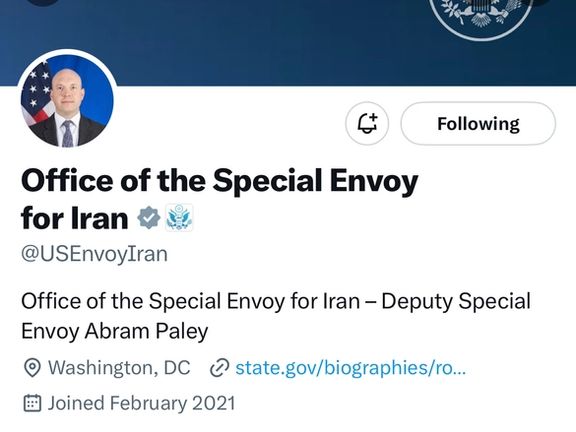
The deputy of former US envoy for Iran has taken over his Twitter account after his suspension for security reasons was reported two weeks ago.
The office of the US Special Envoy for Iran showed its first signs of life following days of media storm about circumstances surrounding former envoy’s dismissal on Friday.
The official twitter account of the mission said: “The Office of the Special Envoy for Iran and the entire team at the State Department remain engaged in implementing our policy on Iran.” The account had been inactive since early June, about a month before Malley’s suspension was announced.
The Biden administration and the State Department are under fire by the Congress, which was kept in the dark about the developments around Robert Malley, including his unpaid leave of absence, suspension of his security clearance and the FBI investigation over his mishandling of confidential information.
The account, whose profile picture has been changed to Deputy Special Envoy Abram Paley – Malley's replacement – added: “We continue our work with allies and partners to constrain Iran’s destabilizing behavior, defend human rights, encourage de-escalation, and promote a stable, prosperous, and more integrated Middle East.”
Malley’s suspension was first reported by Iran International on June 29, and formally announced the following day by Matthew Miller, the spokesperson for the US State Department, calling it "a leave of absence”, adding that his duties would be temporarily assumed by his deputy, Abram Paley. However, it is believed he had been suspended as early as April.
The development came a day after a group of 18 Republican senators called for a probe into the handling of Malley’s security clearance investigation by the State Department.
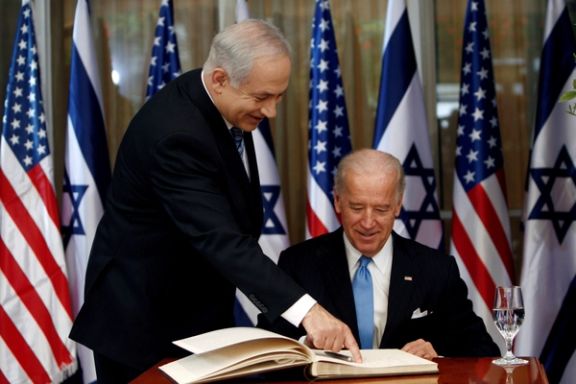
The Wall Street Journal says President Joe Biden’s repeated criticism of Israeli Prime Minister Benjamin Netanyahu, is worse than how he treats “the ruling mullahs in Iran.”
In an editorial on Thursday, the WSJ argued that the Biden administration’s criticisms of Netanyahu’s judicial reforms constitute interference in Israel’s internal affairs, “in which the US President has no business.”
The Journal argued that Biden’s negative comments about Netanyahu’s policies advance the interests of the Islamic Republic of Iran.
“While Mr. Biden undermines the Netanyahu government, Hamas and other Iranian proxies are gaining power in the West Bank, activating another front against Israel. The new wave of terrorism against Jewish civilians will set back the Palestinian cause but advance Iran’s,” the editorial said.
It also criticized Biden for his failure so far to expand the Abraham Accords because of his less than amicable posture toward Saudi Arabia.
“Perhaps most disappointing has been the failure to extend the Trump-brokered Abraham Accords. The Saudis are the prize, but Mr. Biden’s open hostility drove them to hedge their bets by signing a Chinese-brokered deal with Iran instead. Normalization with Israel may have to wait for a U.S. President interested in rallying a coalition to contain Tehran.”
The Wall Street Journal went on the highlight the Biden administration's failure to conclude a “longer and stronger” nuclear deal with Iran, and instead aim for “an unwritten, stopgap agreement “that would give Tehran tens of billions of dollars to sit on the precipice of nuclear breakout. Call it Hezbollah’s and Islamic Jihad’s lucky day.”
The editorial concluded by saying, “While Tehran escalates its proxy wars and whittles down U.S. nuclear demands, Mr. Biden carries out diplomatic offensives against Saudi Arabia and Israel.”
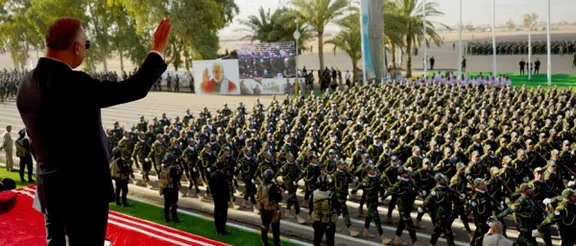
A group of students from Tehran University has expressed opposition to the admission of Iraq’s Hashd al-Shaabi militia forces as students.
In a statement issued on Thursday, the student activists said they would not accept “military forces, whether in combat or school uniforms, within the university premises".
Vowing to resist their presence, which many fear is an attempt to suppress dissidents in the institution, they said that the university’s atmosphere is already poisoned due to the presence of professors affiliated with the regime and Basij militiamen masquerading as students. They accused the authorities of sidelining students by suspending, removing, and suppressing them, while replacing them with borrowed forces from Iraq.
The activists lamented the university's transformation from a symbol of academic independence to a mere instrument of military tyranny, stating, “The presence of these individuals as university administrators only perpetuates a cycle of crises and disasters. Today, we realize that within the minds of those in power, we are denied the right to study and even the right to exist."
In contrast, the student activists highlighted the plight of imprisoned, expelled, and suspended students, who find themselves unjustly excluded for voicing grievances against the regime, while Hashd al-Shaabi forces gain admission.

Al-Hashd al-Shaabi was established back in 2014, following a fatwa to fight ISIS, which controlled four governorates and reached the borders of the capital Baghdad at the time. The Iraqi state-sponsored umbrella organization is composed of approximately 67 different armed factions, with around 128,000 fighters that are mostly Shia Muslim groups, but also include Sunni Muslim, Christian, and Yazidi groups.
Tehran University's public relations office announced members of Iraq's Shiite Hashd al-Shaabi militias and other proxies of the Islamic Republic can study at Iranian universities following a meeting attended between the head of Supreme Leader Ali Khamenei's representatives at the universities and the education deputy of Hashd al-Shaabi.
It has caused outrage among students who also criticized the advantages enjoyed by regime-affiliated students and the rich as well as entrance exam biases, which have discouraged many talented and hardworking individuals from pursuing higher education.
Students hailing from the wealthiest families, and those affiliated with IRGC’s Basij forces as well as those whose family members are war veterans, or what regime calls "martyrs”, have a much greater chance of admission to top universities in Iran, prompting many to blame corruption by the entrance exam ‘mafia’.
The Tehran University students’ statement also emphasized the disparity between the easy entry of members from Hashd al-Shaabi and the obstacles faced by socially and politically marginalized groups within Iranian society. They argued that the university administration's prioritization of military forces over ordinary people and dissidents undermines the principles of equal educational opportunities.
The student movement has played a significant role in the formation and continuation of last year's popular protests, sparked by the death of a 22-year-old woman, Mahsa Amini, in morality police custody. In recent weeks, security forces in Iran have unleashed a fresh wave of crackdowns at universities employing both verbal and physical assault to suppress the student movement.